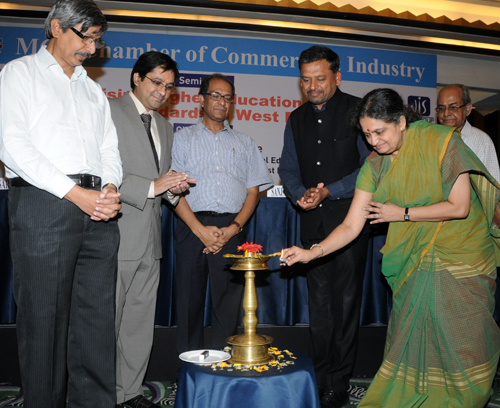MCCI organised a Seminar on ‘Raising Higher Education to Global Standards in West Bengal’ today at The Park Kolkata, which was inaugurated by Dr. Partha Chatterjee, Hon’ble Minister of Higher Education, School Education & Parliamentary Affairs, GoWB and with erudite speakers comprising, Dr Suranjan Das, Vice Chancellor, Calcutta University; Dr. Anuradha Lohia, Vice Chancellor, Presidency University andDr. Ajoy Kumar Ray, Director, Indian Institute of Engineering Science and Technology, Shibpur.
Dr. Chatterjee laid emphasis on Value-based Education System and stressed on ‘making of good Human Being’ over and above all other priorities that should be focused upon. ‘Coming together is a progress, working together is a success and achieving together is an excellence’, remarked Dr. Chatterjee whorequested all the Chambers of Commerce in Kolkata to come forward and lend their hands in the development of educational infrastructure in the state institutions. Dr. Chatterjee assured that unnecessary agitation by students hampering the academic atmosphere in educational institutions will not be entertained at any cost.
‘Expansion’, ‘Excellence’, ‘Equity’ and ‘Employability’ are the four catchwords identified in the 12th Plan document and striking a balance between these 4 E’s is the biggest challenge that the present education system is facing, proclaimed Dr. Das. With ‘more than 30,000 colleges, 0.1 million teachers and more than 14 million students at present’ compared to ‘less than 7 colleges, 15,000 teachers and 5 lac students in 1950, India is at a much superior position compared to other ex-colonial countries so far Higher Education is concerned, opined Dr. Das who advocated for ‘creation of rounded inclusive citizenship as the basic purpose of Education’. In this context he viewed that globalization in Higher Education is requisite for improvement but not at the cost of unsettling the present system.
According to Dr. Lohia, ‘Higher Education is not for masses but for those who are actually interested and committed towards it’ and once it happens, Excellence would automatically be achieved. Taking example of US, she said – ‘Competition breeds Excellence’ and we should keep our doors open for the rest of the world to become more competitive. Some of her suggestions include – ‘prevention of student agitation in Colleges & Universities’ and ‘Importance of all streams in the curriculum’ to promote Equity which according to her is with the parents, society and students at large. We need to be excelled collectively, morally and ethically first to achieve global excellence, boasted Dr. Lohia.
‘All regulations are not be implemented’, ‘students should not always be dictated’, ‘Knowledge space should be opened up’ and ‘Interdisciplinary and integrated approach without segmentation and differentiation is to be adopted’ were the message of Dr. Ray to the forum who felt that academicians should learn to adapt to changes and teachers have lot to learn from the students and should follow some of their thoughts. West Bengal has the best laboratories in the country and houses the ‘Indian Association for the Cultivation of Science’ founded by Dr. Mohendra Lal Sarkar – the 1st Indian Institute that brought in the concept of research in British India, lauded Dr. Ray.
Shri Sanjay Agarwal, President, MCCI raised concern over the ‘low Gross Enrollment Ratio in Higher Education India and West Bengal’, ‘non-existence of Indian Universities among the top 200 in the world’, ‘seperation of Research and Teaching in the present Higher education system’, ‘unemployability of Indian graduates and Engineers in the industry’ etc. He suggested adoption of an ‘engagement model’ of teaching rather than ‘talk-down model’ as used earlier and suggested that Learning process should be made ‘Smart Class’ where computers and learning content, teachers and the students integrate in a stimulating environment.



